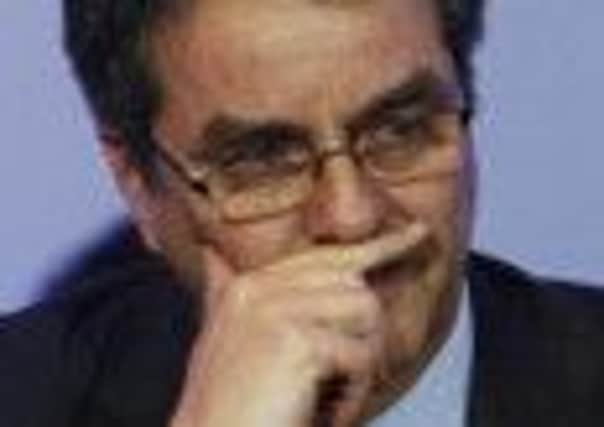‘Historic’ deal to boost global trade approved


In a surprise breakthrough, a WTO meeting in Bali secured a deal to lower barriers and speed up customs procedures after overcoming late objections from India and Cuba.
As well as promising an estimated £613 billion boost to international trade, the deal keeps alive the hope of a wider agreement being reached between rich and poor countries.
Advertisement
Hide AdAdvertisement
Hide AdPrime Minister David Cameron welcomed the move. “Trade is a vital part of our long-term economic plan and was one of my G8 priorities this year,” he said.
“So I am delighted that we have secured an impressive global deal worth over £1bn a year to British businesses and £70bn globally.”
WTO director-general Roberto Azevedo shed tears during the summit’s closing ceremony as he thanked host nation Indonesia, WTO member countries and his wife.
“We have put the world back into the World Trade Organisation,” he said. “For the first time in our history, the WTO has truly delivered.”
Trade ministers had come to the four-day WTO meeting on the resort island of Bali with little hope that an agreement would be reached after years of inertia in trade negotiations.
The talks were threatened at the 11th hour when Cuba objected to the removal of a reference to the decades-long US trade embargo that Cuba wants lifted.
India had also been an obstacle because of its vociferous objections to provisions that might endanger grain subsidies aimed at ensuring its poor get enough to eat. WTO members gave developing nations a temporary dispensation from subsidy limits, shelving the issue for negotiations at a later time.
“This week has been about high-level diplomacy, long nights and considerable drama,” said Indonesian trade minister Gita Wirjawan, who chaired the meeting. “But it has also been about ensuring that the gains of the multi-lateral trading system reach our small businesses and our most vulnerable economies.”
Advertisement
Hide AdAdvertisement
Hide AdThe centrepiece of the agreement reached in Bali was measures to ease barriers to trade by simplifying customs procedures and making them more transparent.
The deal could boost global trade by £613bn and also keeps alive the WTO’s broader Doha Round of trade negotiations, sometimes known as the development round because of sweeping changes in regulations, taxes and subsidies that would benefit low-income countries.
Azevedo said the WTO will spend the next year developing a fresh approach for moving forward with the Doha negotiations.
“The WTO has re-established its credibility as an indispensable forum for trade negotiations. Nor is this a paper victory: streamlining the passage of goods across borders by cutting red tape and bureaucracy could boost the world economy,” the US Chamber of Commerce said in a statement.
The idea behind the WTO is that if all countries play by the same trade rules, then all countries, rich and poor, will benefit.
But some critics say WTO rules may hinder countries from setting their own priorities in environmental protection, worker rights, food security and other areas. And they say sudden reductions in import tariffs can wipe out industries, causing job losses in rich and poor countries.
Oxfam welcomed the breathing space on food subsidies given to poor countries but said the agreement, and the move to simplify customs in particular, was “no game-changer” overall.
“Its gains have been grossly overestimated, while the costs of implementation for poorer countries were completely ignored,” the aid and development group said.
Advertisement
Hide AdAdvertisement
Hide AdThe WTO was formed in 1995. Apart from being a forum for world trade talks, the organisation arbitrates trade disputes between member countries.
EU trade commissioner Karel De Gucht said: “I believe it’s a very important deal. It is the first one since the inception of the WTO two decades ago.
“I would argue that what we did today is a quarter of the Doha agenda. On top of that, it’s a stepping stone.
“It will add a lot to the trading capacity of the least-developed countries and developing countries.
“If they have more trading capacity, it will also result in more investment in logistics and infrastructure, in all kinds of procedures that are part of the trading process, thereby creating new opportunities.”
Trade minister Lord Green, a vice-chair of the Bali conference representing developed nations, said: “This is a great day for the global trading system.
“We’ve demonstrated that the WTO can deliver significant multilateral trade deals.
“The deal we have agreed here today is good for the UK and even better for developing countries.
Advertisement
Hide AdAdvertisement
Hide Ad“It will bring real benefits to businesses in every country, in particular to small firms which are hardest hit by the costs of trading across inefficient borders.”
Business Secretary Vince Cable said: “Cutting red tape and breaking down barriers at borders will create new opportunities, especially for small businesses to export.
“Trade plays a key role in creating jobs and supporting a stronger UK economy.
“It will also bring growth around the world, which is not only good for developing countries but will create new markets for British businesses to invest in.
“The road to securing a trade package in Bali was hard work. I would like to congratulate all the countries that have come together to reach this significant agreement.”